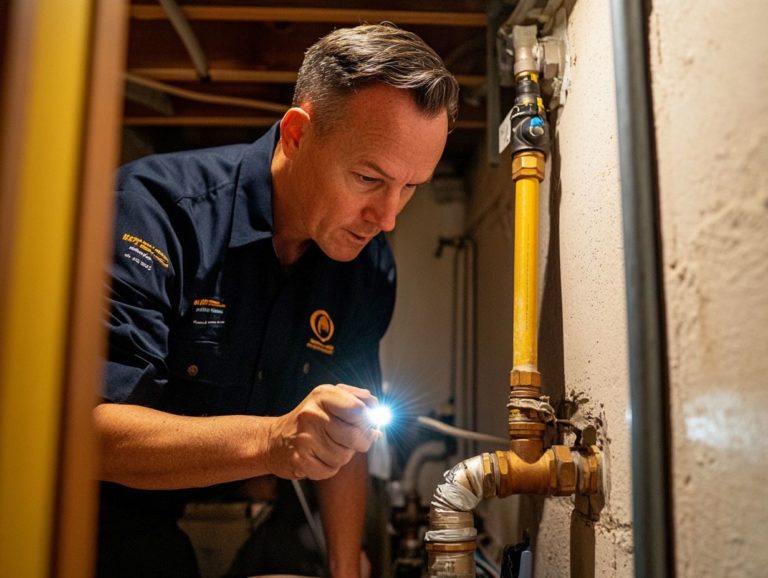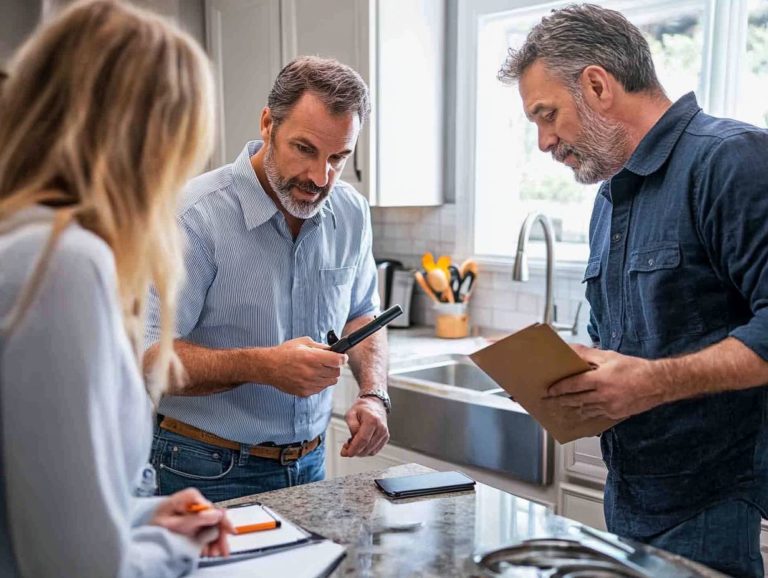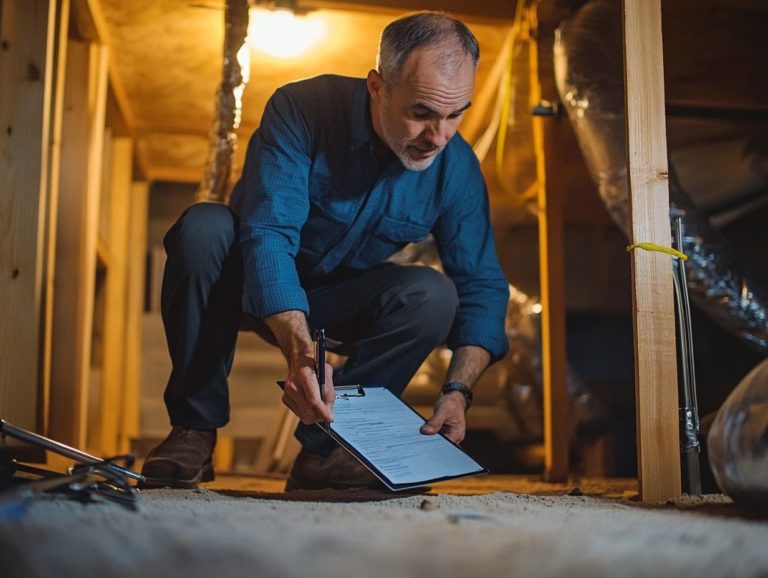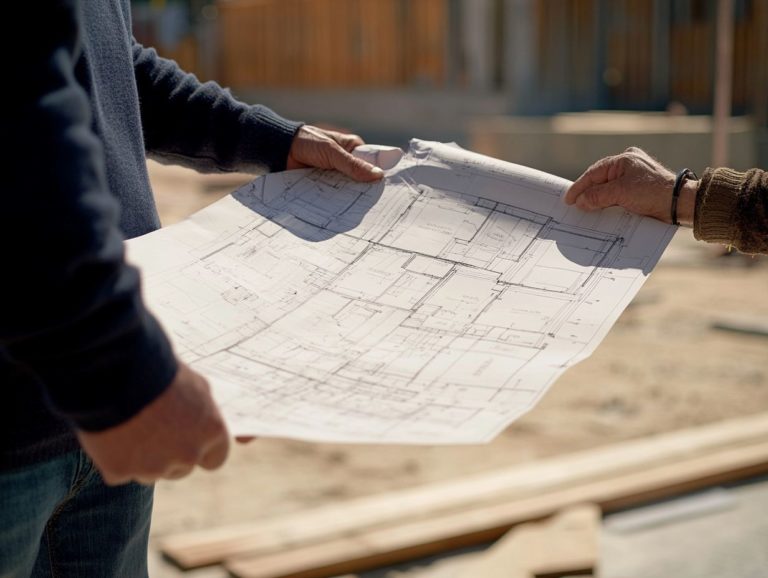How to Choose the Best Home Inspector
Buying a home is one of the most significant investments you’ll ever make, and ensuring it’s in good condition is absolutely crucial.
Home inspections are essential for uncovering hidden issues that could end up costing you a fortune later on. This article delves into the importance of home inspections, outlines the qualifications to seek in a home inspector, and presents crucial questions you should ask before making your choice.
It guides you through what to expect during the inspection process and how to secure a thorough evaluation. Whether you’re a first-time buyer or a seasoned homeowner, understanding these factors will empower you to make informed decisions.
Contents
Key Takeaways:

A home inspection is crucial for identifying potential issues and ensuring the safety and integrity of a property.
Choose a home inspector based on their certifications and experience. For guidance on selecting the right professional, refer to this resource on how to choose the best home inspector near you. Ask questions to make sure they can do a thorough job.
Factors to consider when choosing a home inspector include their reputation, availability, and cost.
If you have concerns, communicate them to the inspector and address them before finalizing the inspection.
Why Home Inspections are Important
Home inspections are essential in the home buying journey, offering you important information about the property’s condition and safeguarding you against hidden problems like mold infestations, structural issues, and problems with heating, cooling, or appliances.
A thorough checkup delves into various aspects of the home, including plumbing and electrical systems, delivering a detailed evaluation that significantly influences real estate transactions.
Finding issues early helps you save money and make smart choices. Therefore, it s essential to enlist the expertise of seasoned inspectors, ideally those recommended by trusted real estate agents and reputable industry trade groups.
Understanding the Purpose and Benefits
The purpose of a home inspection is to arm you with detailed insights into the property’s condition, providing essential protection by revealing hidden issues.
This process not only shields you from unexpected repair costs but also enables you to develop effective negotiation strategies during the buying process.
With the knowledge gleaned from the inspection, you can address any concerns with the seller, potentially securing price reductions or repair commitments before the deal is finalized.
Understanding the responsibilities that come with homeownership is crucial; an inspection not only highlights immediate concerns but also prepares you for future maintenance.
This helps you make a smart investment that fits your goals!
Qualifications to Look for in a Home Inspector

When you re on the hunt for a home inspector, it s crucial to evaluate their qualifications. Look for certification requirements established by professional associations, as well as their history of experience in the field.
Trusted references and customer reviews can offer valuable insights into the inspector s reputation, while affiliations with organizations like the Better Business Bureau provide an added layer of assurance regarding their credibility.
Certifications and Experience
Certifications and experience are essential considerations when selecting a home inspector, as they reflect the inspector’s commitment to the industry standards set by professional associations. For more detailed guidance, check out how to choose the right inspector for your needs.
Choosing an inspector accredited by the American Society of Home Inspectors (ASHI) or similar organizations not only guarantees that they have met rigorous educational and evaluative criteria but also signifies a commitment to ongoing professional development. To ensure you find the right fit, it’s helpful to know how to spot a good home inspector.
The inspector’s years of experience can significantly impact the thoroughness of the inspection process. Experienced professionals are often skilled at identifying subtle signs of potential problems that a less experienced inspector might overlook.
By choosing someone with relevant certifications and a solid track record in the field, you gain invaluable peace of mind, enabling you to make informed decisions about your real estate investments.
Questions to Ask a Potential Home Inspector
Asking the right questions can profoundly influence your decision when selecting a home inspector. It’s essential to gather pertinent information regarding their qualifications and costs, including knowing how to find a qualified home inspector.
This approach not only enables you to make a well-informed choice but also safeguards your investment.
Key Inquiries to Make
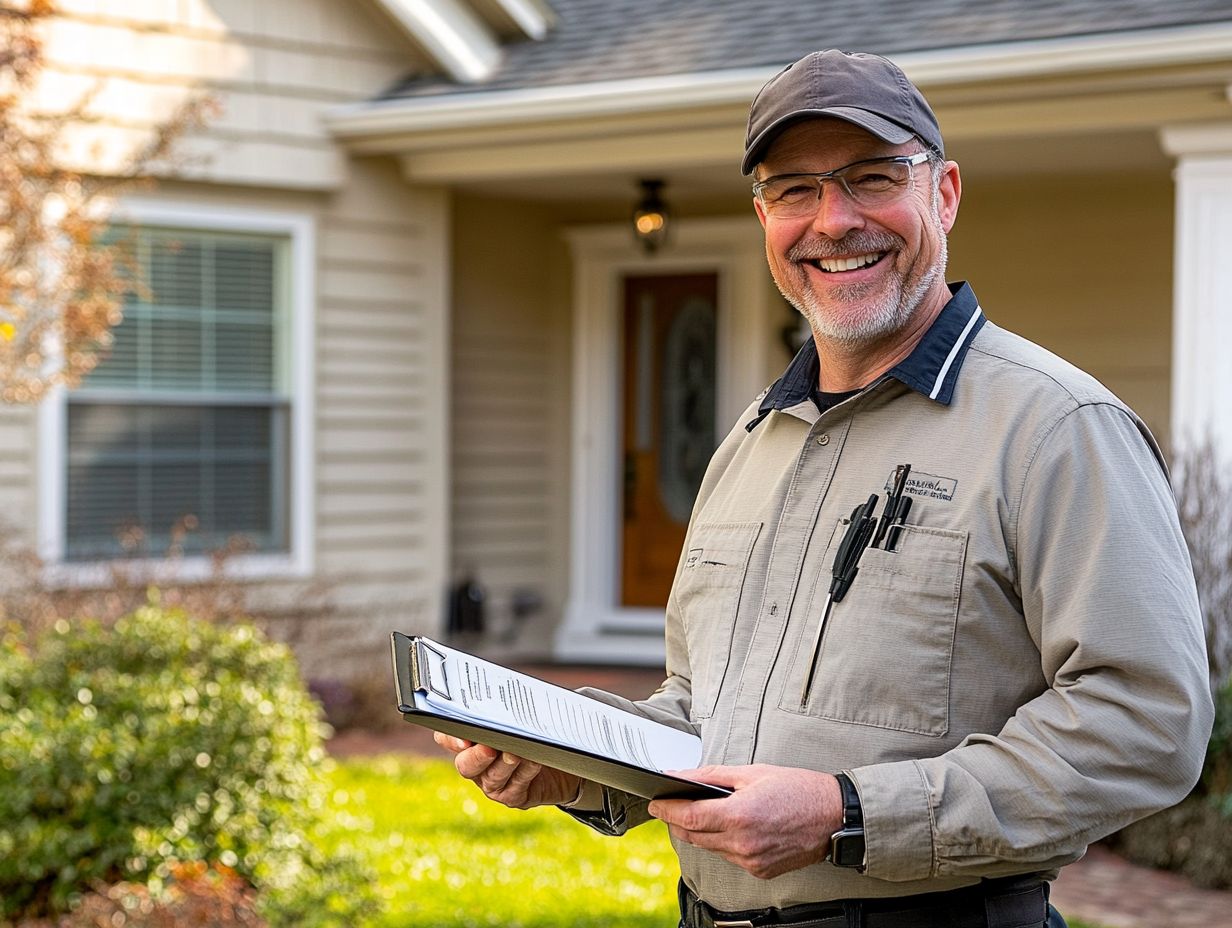
When you re interviewing a potential home inspector, there are several key questions you should ask. Start by asking for inspection quotes, and inquire about their process.
Don t forget to request reviews from past clients; these can be incredibly revealing. Also, dig a little deeper by asking how long they ve been in the business and whether they hold any professional certifications. Their experience can significantly affect the quality of your inspection.
Consider their specific areas of expertise. Some inspectors specialize in certain property types, which could be beneficial depending on your needs.
Taking the time to read customer reviews and check complaints directories can offer valuable insights into their reliability and service quality. This essential feedback often highlights recurring strengths or weaknesses, guiding you toward a more informed decision.
What to Expect During a Home Inspection
During a home inspection, you can anticipate a comprehensive evaluation of the property. The inspector will meticulously conduct a visual assessment of essential components, including the foundation, roofing, plumbing systems, and electrical systems.
Often, they employ advanced technology to elevate the quality of the inspection, ensuring no detail goes unnoticed.
The Inspection Process and Timeline
The home inspection process typically unfolds in several stages, starting with an initial visual check followed by a thorough evaluation of the property. This journey can take several hours, depending on the size and condition of the home.
In this initial phase, the inspector identifies any obvious issues, such as roof damage, foundation cracks, or signs of water intrusion. After that, a detailed examination ensues, covering vital systems like plumbing, electrical, and HVAC (heating, ventilation, and air conditioning).
During this comprehensive inspection, the inspector employs specialized tools to uncover hidden problems, ensuring that no detail goes unnoticed.
Understanding these evaluations is key. They can reveal major issues that could lead to costly repairs down the line. Recognizing these potential red flags enables you to make informed decisions about your investment.
Choosing the Right Home Inspector for Your Needs
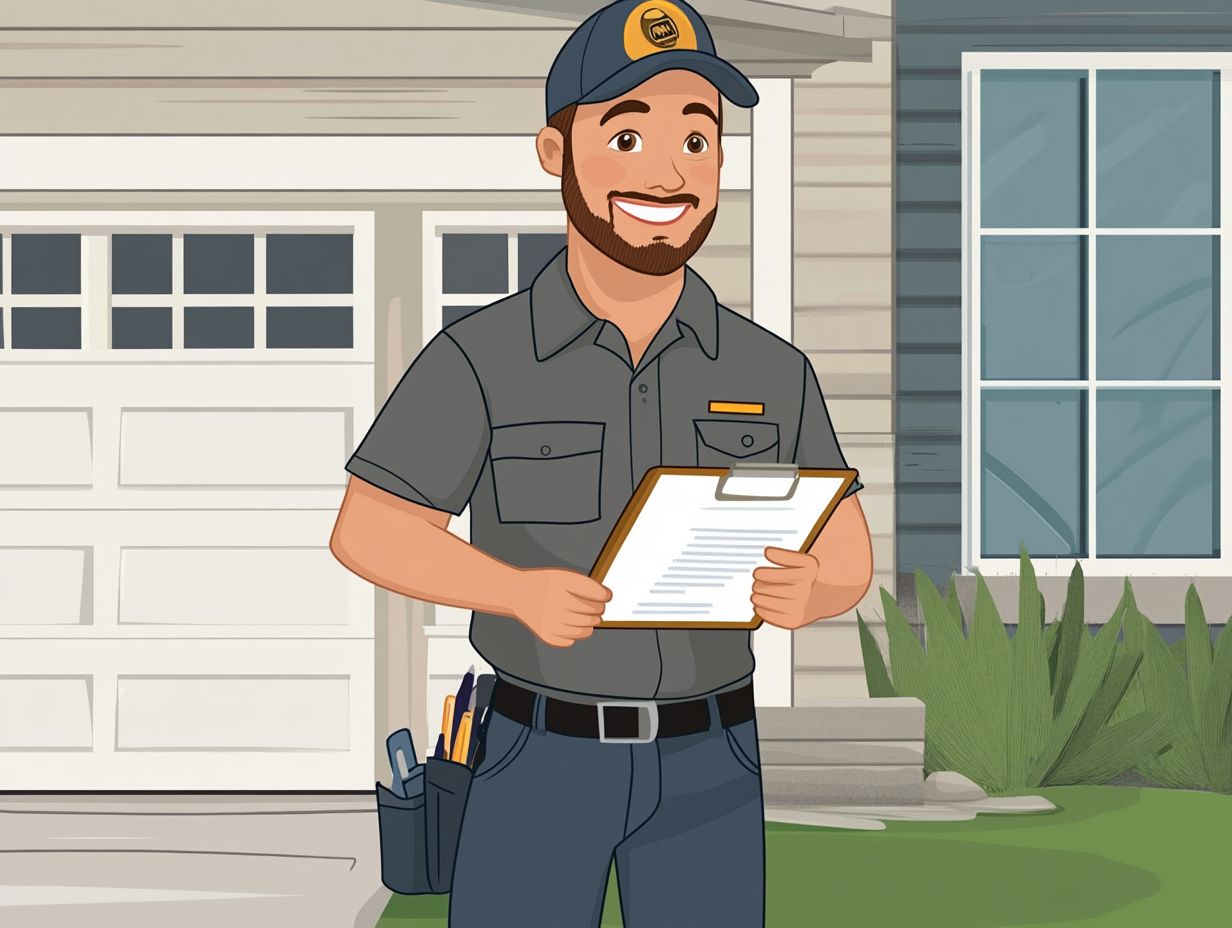
Selecting the right home inspector is crucial for securing a comprehensive evaluation of your property, and knowing how to choose the best home inspector can make all the difference.
You’ll want to consider several key factors, including the inspector’s qualifications, their insurance coverage, and how to select a home inspector for your needs based on recommendations from reliable real estate agents or referral networks.
This meticulous approach will help ensure that your inspection is both thorough and trustworthy.
Factors to Consider
When selecting a home inspector, consider several key factors. Look into their qualifications, the availability of inspection quotes, and whether they have appropriate insurance coverage. Additionally, you can refer to resources on how to choose the right inspector for your home for more guidance.
It s imperative to verify the inspector s credentials, such as licenses and certifications, as these can significantly influence the quality of the inspection. Seeking referrals or reviews from past clients can help gauge their expertise and professionalism.
Insurance coverage is also crucial; an inspector with adequate liability insurance ensures that any errors or oversights during the inspection process are properly addressed. This protects your financial investment and brings peace of mind, knowing that your future home has been thoroughly evaluated by a qualified professional.
Ensuring a Thorough Inspection
To guarantee a comprehensive inspection, it’s essential for you to understand the quality of the inspection being offered.
Don’t hesitate to ask about the potential for additional tests, particularly for specialized issues like mold, radon, or lead, which may not be included in a standard home inspection.
Being proactive in this regard can provide you with peace of mind and a clearer picture of the property s condition.
What to Do if You Have Concerns
If you have concerns about the quality of the inspection or any safety issues, tackle these matters swiftly. Start by reviewing the inspection report and talking with your inspector.
Opening a dialogue with your inspector can bring much-needed clarity and ease any uncertainties you might be feeling. Don t hesitate to ask about their qualifications, training, and experience to ensure they have a robust background in the industry.
If you notice discrepancies in the report, consider seeking a second opinion from another certified inspector. Doing your homework on the inspector s credentials can give you the confidence you need to proceed.
Remember, making a well-informed decision depends on thorough inspections and a clear understanding of potential safety concerns.
Frequently Asked Questions
What qualifications should I look for in a home inspector?
Choose a home inspector who is licensed and certified by a reputable organization, like the International Association of Certified Home Inspectors (InterNACHI) or the American Society of Home Inspectors (ASHI). For comprehensive guidance, learn how to choose the best home inspector for your needs. Additionally, check their experience and read reviews from previous clients.
Is it necessary to attend the home inspection?
While it is not required, we strongly encourage you to attend the home inspection. This allows you to ask questions and address any concerns in real-time. It’s also a great opportunity to learn more about the home’s condition and any potential maintenance or repairs needed.
What should be included in a home inspection report?
A good home inspection report should include a detailed description of the home’s structure, foundation, plumbing, electrical, heating and cooling systems, and any other significant features. It should also include photos and recommendations for repairs or further inspections.
Can I choose any home inspector recommended by my real estate agent?
While your real estate agent may have a list of preferred home inspectors, it’s important to do your own research and choose the right home inspector for you. This ensures an unbiased and thorough inspection of the property.
How much does a home inspection typically cost?
The cost of a home inspection can vary depending on the size and location of the property, as well as the inspector’s experience. On average, a home inspection can cost between $300 and $500. Remember, a higher price does not always indicate a better inspection.
What should I do if I am not satisfied with the home inspection?
If you have any concerns or questions about the home inspection report, discuss them with the inspector directly. They may provide further clarification or recommendations for next steps. If you are still not satisfied, consider seeking a second opinion from another qualified home inspector.
Take the time to choose the right inspector your peace of mind is worth it!

